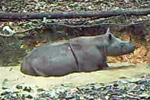The Dallas Safari Club has auctioned off a permit to shoot-and-kill a Critically Endangered black rhino in Namibia for $350,000. The club says the proceeds from the auction will aid rhino conservation, but the move has upset many wildlife organizations and attracted protestors outside the closed-door auction. In fact the issue has become so contentious that the FBI is currently investigating purported death threats against the Dallas Safari Club members over the issue. Currently, less than 5,000 black rhinos survive in the wild today, a drop of 90 percent since 1960 as the species has been decimated by poaching and habitat loss.
“How about auctioning a few Siberian tiger permits or Asian elephants or orangutans? Where will this covetous behavior stop?” writes Wayne Pacelle, the CEO of the U.S. branch of the Humane Society, in an opinion piece. “The strategy behind these auctions has surface appeal but is lacking in common-sense, moral reasoning.”
However, the Dallas Safari Club, which has not released the name of the top bidder, says the hunter will only be allowed to kill a non-breeding male rhino, which has reportedly become aggressive towards other rhinos. The hunt will be closely managed by Namibia, which auctions off about three rhinos a year to trophy hunters, but this is the first time the auction was allowed in the U.S.

A pair of black rhinos in Tanzania. Photo by: Brocken Inaglory/Creative Commons 3.0.
Still, conservation groups say that allowing a Critically Endangered animal to be hunted sends the wrong message.
“This is, in fact, making a spectacle of killing an endangered species,” Jeffrey Flocken, with the International Fund for Animal Welfare (IFAW), told the Associated Press.
Black rhinos are listed under the U.S. Endangered Species Act, which under normal conditions would make it impossible for a trophy hunter to bring any parts of the species back into the U.S. However, the act allows people to import animal parts under special circumstances. In this case the hunter may be allowed to bring back their “trophy” if they prove they supported conservation efforts through their payments. Such a permit was issued just last year for a black rhino. However, the Dallas Safari Club took bids via phone, which means the hunter may not be America.
Rhino populations worldwide, already small and fragmented, are suffering from a mass-poaching crisis. Last year, nearly 800 rhinos were shot dead by poachers in South Africa, which has become the epicenter of poaching since it supports the world’s largest remaining population of rhinos. Rhinos are killed for their horns, which are turned into powder and consumed as a curative in some East Asian countries, despite no medical evidence for its efficacy.
Related articles
Requiem or recovery?: the Sumatran rhino 200 years after its description

(01/08/2014) In 1893, William Bell, a surgeon in the service of the Dutch East India Company stationed in Bencoolen, Sumatra, examined the body of a dead rhinoceros. The animal, a male, was relatively small as rhinoceroses go, measuring only four feet four inches at the shoulder and eight feet five inches from its nose to the tip of its tail. Dr. Bell noted that the animal resembled a large hog and judged it to be a young individual based upon the condition of the bones and teeth.
Consumer report uncovers why people buy rhino horn
(11/26/2013) The rhinoceros is one of the largest and most iconic animals to roam the earth. However, poaching for their horn, erroneously believed to have medicinal value, has led the IUCN Red List to classify three of the world’s five species as Critically Endangered. But, a new consumer report by the wildlife trade monitoring network, TRAFFIC, finds that rhino horn consumers in Vietnam buy the illegal product as much to raise their social status as to attempt to treat a fever or hangover.
New campaign: hey China, stop killing the ‘pandas of Africa’

(10/29/2013) A new public-service campaign in China will ask potential ivory and rhino horn buyers to see the victims of these illicit trades in a new light: as the “pandas of Africa.” The posters are a part of WildAid’s ‘Say No to Ivory and Rhino Horn’ campaign, which was launched earlier in the year.
790 rhinos poached in South Africa this year
(10/29/2013) 790 rhinos have been poached in South Africa this year, nearly a fifth higher than last year’s record toll, reports the Department of Environmental Affairs.
WWF risking Sumatran rhinos by releasing camera trap images, says scientist

(10/09/2013) On October 2nd, WWF released camera trap videos of Sumatran rhinos surviving in Kalimantan, Indonesian Borneo. The conservation organization had already announced in April that they had evidence of at least one Sumatran rhino in the province, but the new images confirmed what is likely to be a small surviving population. While this is good news for an animal on the edge of extinction, Erik Meijaard, a researcher who has worked in Indonesia for over 20 years, says WWF has made a mistake publicizing the news around the world, noting ‘the last thing those rhinos need is publicity.’
Unlikely success: how Zimbabwe has become a global leader in rhino conservation
![]()
(10/02/2013) With its collapsed economy, entrenched poverty, and political tremors, one would not expect that a country like Zimbabwe would have the capacity to safeguard its rhinos against determined and well-funded poachers, especially as just across the border South Africa is currently losing over two rhinos a day on average. And indeed, without the Lowveld Rhino Trust (LRT), rhinos in Zimbabwe would probably be near local extinction. But the LRT, which is centrally involved in the protection of around 90 percent of the country’s rhinos in private reserves along with conservancy members, has proven tenacious and innovative in its battle to safeguard the nation’s rhinos from the poaching epidemic.
Worst rhino poaching year on record for South Africa
(09/29/2013) At least 688 rhinos have been poached in South Africa this year, surpassing last year’s record of 668 with more than three months remaining in 2013, reports the country’s top environmental official.
Poaching jumps since South Africa announced support for legal rhino horn trade
(09/20/2013) South Africa has experienced an uptick in rhino poaching since Environmental Minister Edna Molewa called for legalizing the rhino trade, reveals analysis by the Environmental Investigation Agency (EIA).







